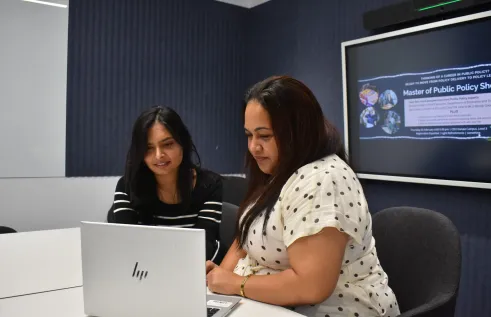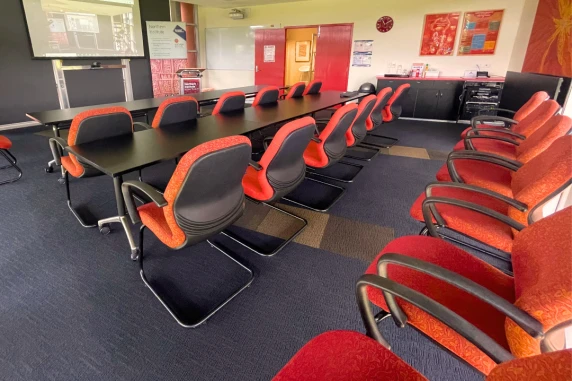Northern Institute
Master of Public Policy Student Presentations
| Presenter | Multiple | |
|---|---|---|
| Date/Time |
to
|
|
| Contact person |
Northern Institute
|
|
| Location | Northern Institute’s Savanna Room (Casuarina Campus, Building Yellow 1, Level 2, Room 48) | |
| Open to | Public | |
Join us and support our Master of Public Policy students give their final presentations.
These presentations are online via Zoom and will also be available to watch at the Northern Institute’s Savanna Room (Casuarina Campus, Building Yellow 1, Level 2, Room 48), no registration needed in person. To join online, please register below. Once you register, you will receive an individual link from Zoom no-reply@zoom.us. Recordings will only be available for student reference and are not available to the public.
Thursday, 15 May
10-10:45 am (Darwin)
Preparing Culturally Responsive Teachers for Indigenous Primary Schools in the Northern Territory: A Scoping Review
This presentation explores how culturally responsive teaching (CRT) can be better embedded in pre-service teacher education for Indigenous students in the Northern Territory. Through a scoping review of 23 sources, the study identifies five key areas needed for CRT implementation: 7Indigenous knowledge, community engagement, responsive pedagogy, reflective practice, and policy support. The findings aim to improve teacher preparation and inform public policy that supports equity in NT schools.
Prakriti Paudel is originally from Nepal and moved to Darwin in 2023 to pursue a Master of Public Policy at Charles Darwin University. She holds a Bachelor’s degree in Public Health from Purbanchal University, Nepal, and had around 3 years of experience as a Research Assistant at the Center for Research on Environment, Health and Population Activities (CREHPA). With a strong interest in both public health and public policy, she aims to contribute to community development through evidence-based research and policy-making. Prakriti is passionate about public service and values building meaningful relationships within the communities she works with.
11:15 am – 12.00 pm (Darwin)
Evaluating Health Policies in Addressing Cancer and Health Disparities in NT, Australia (2014-2025)
This research evaluates health policies implemented in the Northern Territory (NT) between 2014 and 2025, focusing on their effectiveness in reducing cancer incidence and addressing health disparities between Indigenous and non-Indigenous populations. Using a desktop-based analysis of government reports, policy documents, academic literature, and cancer-related health programs and initiatives, the study identifies key policy outcomes, recurring trends, existing gaps, and opportunities for improvement. The findings aim to inform more equitable and culturally responsive health strategies in the NT.
Om G C is a dedicated public policy student with academic and professional experience spanning education, language, social services, and health. He holds a Bachelor's degree in the Teaching of Chinese to Speakers of Other Languages and has advanced academic skills in Chinese languages and cross-cultural communication. His previous research examined the learning motivations of Nepalese students studying in China. Now based in the Northern Territory, his current research focuses on evaluating health policies and their impact on cancer outcomes and health disparities, particularly among Indigenous communities.
Friday, 16 May
10-10:45 am (Darwin)
How Does Pragmatic Philosophy Contribute to the Practical Aspects of Policymaking? The Northern Territory Local Decision-Making Process as a Case Study.
This dissertation focuses on policy implementation and pragmatic philosophy, specifically the NT LDM framework for local decision-making. The research aims to demonstrate how the NT LDM framework accurately translates pragmatic principles into practice and flexibility by making successive policy adjustments and incorporating evidence through relational and stakeholder engagement. The study reveals that pragmatic principles provide valuable resources for participative and effective policy-making.
This research also tries to turn the theoretical ideas of Pragmatism into a practice that enables the Aboriginal people in the Northern Territory to develop policies that suit them best, especially when they are fully involved in the policy development process.
Rabi Patricia Zubair is from Nigeria, West Africa. She completed her first degree in political science in 2005, then worked as an insurance agent for thirteen years before moving to Australia in 2022. Several policies made in her country failed, and because of this, she needed to have more ideas about why policies fail, especially to the detriment of the citizens who are meant to benefit more from these policies to better their lives and to improve the country’s development level. This concern drove her to study public policy at Charles Darwin University.
11:15 am – 12.00 pm (Darwin) / 11:45 am – 12:30 pm (Brisbane)
Kellie Chandler will present online (based in QLD)
Understanding Domestic Violence Among Indigenous Communities in the Northern Territory: Trends and Risk Factors
This presentation explores the drivers of domestic violence among Indigenous Australians in the Northern Territory, with a focus on differences between urban and remote communities. The research highlights shifting patterns in alcohol involvement and the growing influence of structural disadvantage using trend analysis of data from 2020–2025 The findings suggest that while alcohol remains significant, broader systemic factors such as housing, overcrowding, and access to education are increasingly critical. The presentation will discuss the implications for policy, service delivery, and future research.
Kellie Chandler is a Master of Public Policy candidate with a strong interest in social policy and Indigenous community engagement. Her research focuses on domestic violence trends among Indigenous Australians and the role of structural disadvantage in shaping community outcomes. Kellie has developed expertise in policy analysis, trend data interpretation, and evidence-based approaches to social challenges through her studies. She is passionate about supporting more culturally responsive and place-based policy solutions that address systemic inequality.
Getting there
Savanna Room @ Northern Institute
CDU Casuarina Campus
Yellow Building 1, Level 2, Room 48
Google Maps location or How to get to Savanna Room.
Access: If you have any additional access or support requirements, please contact us. The Savanna Room is accessible using a lift or one flight of stairs through an automatic door. There is a wheelchair-accessible bathroom on Level 2 and a baby change room on Level 1 (ground floor).
Related Events

Master of Public Policy Showcase
Join Northern Institute for the MPP Showcase during O‑Week in late February to explore what the program offers and take the next step towards leading with purpose.
Read more about Master of Public Policy Showcase
Thesis Talk
Thesis Talk is a facilitated academic discussion for HDR candidates to connect to and through ideas with research peers. Join the monthly online session to explore different topics, theories and practicalities. Talk through the nitty-gritty of research practices and reflect on your work.
Read more about Thesis Talk
'Climate Impacts on Country' Pop-Up Indigenous Art Exhibition
This powerful exhibition celebrates Indigenous culture by showcasing stunning artworks that explore the deep connections between climate, healing, and Country. Including a panel session with the Indigenous artists and researchers involved.
Read more about 'Climate Impacts on Country' Pop-Up Indigenous Art Exhibition




